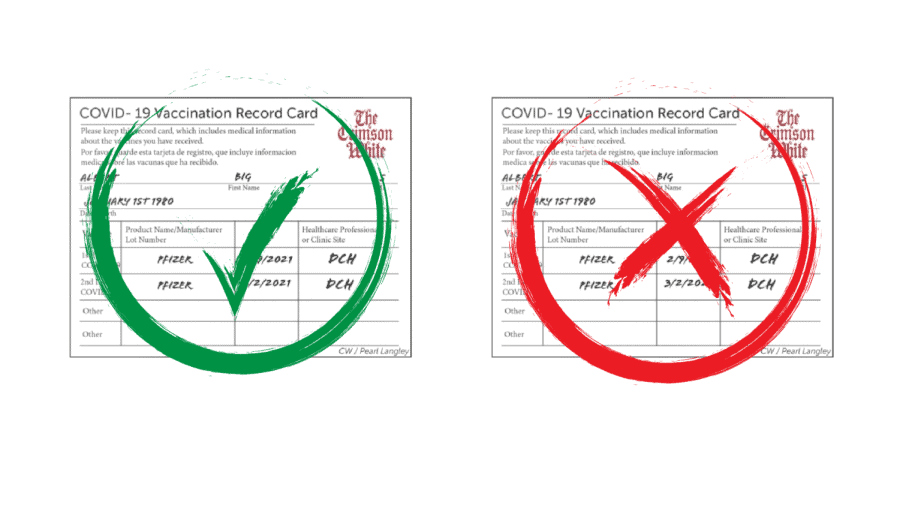UA verifies 2% of student vaccine cards
October 8, 2021
More than 23,000 students — or 61% of students — have voluntarily reported at least one dose of a COVID-19 vaccination to The University of Alabama. To verify the cards, UA medical staff randomly inspect 2% of submissions every month.
UA spokesperson Shane Dorrill said medical staff refer “those who appeared to knowingly upload false information” to the Office of Student Conduct for review. The verification of self-reported vaccinations is ongoing.
Todd Borst, executive director of the Office of Student Conduct, said his office has not found any fake vaccine cards through its current verification process. He said the medical staff are looking for inconsistencies in the lot number, which tracks the batch of the vaccine from production to delivery, and irregularities in the card design.
“We’re treating this very similar to if a student had a fake ID,” Borst said.
If found guilty of submitting a fake vaccine card, Borst said the student would lose the $40 Bama Cash they received as an incentive.
The University does not require a COVID-19 vaccine for enrollment, but students who self-reported their vaccination cards by Sept. 10 were rewarded with incentives, including $40 in Bama Cash. Students who submitted a photo of their card by Aug. 28 were entered into a raffle for all-access campus parking passes, $1,000 on-campus housing scholarships, pairs of away game football tickets and a lunch with VP for Student Life Myron Pope.
To be eligible for the incentive, students uploaded a photo of their vaccine card to an online form, which serves as the source of the vaccination data on the UA System COVID-19 Dashboard.
Over 1,000 U.S. colleges require COVID-19 vaccination for enrollment, and 55% of unvaccinated students attending those colleges have falsely claimed to be vaccinated. Fake vaccine cards have been purchased online through social media platforms like Instagram and Twitter.
The Department of Health and Human Services, the Office of Inspector General, and the Federal Bureau of Investigation released a statement in March notifying the public that purchasing fake vaccine cards is illegal. Purchasing a fake vaccine card that displays unauthorized use of the Centers for Disease Control’s or HHS’s seal is punishable by a fine or up to five years in prison.
Vanderbilt University, another school in the Southeastern Conference, has an ongoing policy for vaccine card verification. Vanderbilt places a hold on a student’s registration until their vaccine record has been verified unless they have an approved medical accommodation or religious exemption.
At Auburn University, the Department of Student Affairs only inspects the cards of students who won vaccine-related raffles that took place in July. Auburn spokesperson Preston Sparks said no other review of cards occurs.
Jay Blanton, chief communications officer at the University of Kentucky, said the university verifies every student vaccine card by comparing the image provided by students to the information they enter in a form about their vaccine.
“This means we have a team member who manually views each vaccine card and can reject if there are concerns about the validity of a document,” Blanton said.
Zach Johnson, Isabel Hope and Keely Brewer contributed to the reporting of this story.





















